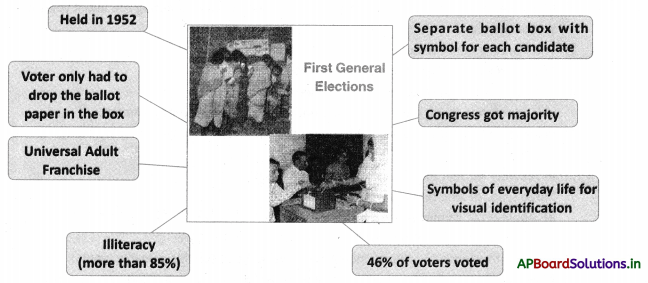Students can go through AP State Board 10th Class Social Studies Notes Chapter 18 Independent India (The First 30 years – 1947-77) to understand and remember the concept easily.
AP State Board Syllabus 10th Class Social Studies Notes Chapter 18 Independent India (The First 30 years – 1947-77)
→ In the early years of independence many challenges like leadership, maintenance of unity and integrity were there.
→ There were also other challenges like social and economic transformation and to ensure the successful working erf democratic system.
→ India adopted Universal Adult Franchise at one go.
→ The first elections were difficult as most people did not know how to read and write.
→ Election Commission used the symbols from daily life for visual identification.
→ In Independent India’s first three general elections in 1952, 1957 and 1962, the Indian National Confess won reducing other participants to almost nothing.
→ Among the first challenges the new nation laced was the demand for the reorganisation of states on the basis erf language.
→ In August 1953 the States Reorganisation Commission was appointed with Fazl Ali, K.M.Panikkar and Hridaynath Kunzru on the basis of linguistic principle.
→ It created 14 States and 6 Union territories.
→ planning Commission was set up to dissolve the divisions of caste and religion, community and region and other disruptive tendencies.
![]()
→ The First Five Year Plan focussed on agriculture.
→ Nehru favoured land reforms, agricultural cooperatives and local self-government for development.
→ India, Indonesia, Egypt together built a policy of not joining either of the power camp named the Non-Alignment Movement.
→ Official Languages Act passed in 1963 made Hindi imposed in all states.
→ The DMK believed that act to be an attempt to foist Hindi on the rest of the country and they began a state-wide protest.
→ The shift of a price-incentive and technocratic strategy between the years 1964 – 67 is called the “Green Revolution”.
→ 1967 elections show the big transition in India where many regional parties came to power.
→ It propounded India is moving towards a multiparty system.
→ Immediately after the victory in the 1971 Bangladesh war, Indira Gandhi used the popular slogan ‘Garibi Hatao’.
→ Raised oil prices inflation, scarcity of food and unemployment gave Congress government the public resentment.
→ Opposition united under Jaya Prakash Narayan formed JP Movement.
→ As the JP movement gaining strength the government imposed an emergency.
→ An important achievement of this period (1947-77) was the establishment of stable democracy.
→ States Reorganisation: Commission set up to address the issue of formation of states on the basis of linguistic principle
![]()
→ One-party dominance: In Independent India’s first three general elections trie Indian National Congress won reducing other participants to almost nothing. It only established governments in states and at the centre also. There was no party to challenge Congress. This period was known as one-party dominance.
→ Emergency: Something dangerous or serious, such as an accident, which happens suddenly or unexpectedly and needs immediate action in order to avoid harmful results.
→ Reg4nal movements: The movement by the people of a region to preserve 2nd promote the language, customs, culture, economy and the way of life of that region.
→ Nationalisation : (of a government) The act of taking control of a business or industry.
→ Universal Adult: Every person, who is a citizen of India and completes 18 Franchise years of age can become a voter irrespective of religion, race, caste, gender, etc.
→ Congress system: The Congress party formed government at the centre and in many states in the first three general elections. This inaugurated what some observers called the Congress system.
→ Multi-party system A country that allows many political parties to exist and vie for power and serve the democracy.
→ Linguistic States: The states which were formed on the basis of the language that their people speak.
→ Planning Commission: It was set up in 1950 to oversee coordinated developmental planning.
→ Election Commission.: An autonomous body that conducts elec Lions to the Parliament and state legislatures in a free and fair manner.
→ Zamindari system: The system wherein Zamindar collected land revenue, on behalf of Mughal emperors and received a share of collected revenue.
![]()
→ Tenancy reforms: Reforms aimed at fixing rent on land, collecting it from the tenant farmers and defining them.
→ Land ceilings Central government set a limit to the size of landholding and redistributing the excess land to the poor.
→ Land reforms: Reforms aimed at farmérs to pay land tax direction to government, abolishing zamindari system and redistributing the land, etc.
→ Cold War: A war of tension caused by the two rival alliances and the USSR
→ Non – Aligned Movement: A foreign po&y which Is aimed to keep aloof from and USSR power blocs and serve the cause of world peace.
→ Panchsheel policy: An agreement between India and China made respect territorial Integrity and sovereignty of nations and practise peaceful coexistence.
→ Anti-Hindi agitations: A statewide campaign by DMK In Tamil Nadu against the imposition of Hindi as the official language for the country
→ Green revolution: Use of high yielding varieties (seeds) for the increase of crop production and better water management
→ Left of the centre group: This group in a party or government usually supports state control and nationalisation and socialism.
→ Regional parties: The parties which secure at least 4% of valid votes In a state In general elections either to Lok Sabha or Vidhana
→ Liberation movement: Movement organised for independence or formation of new
→ Tenant farmers: The peasants who cultivated the lands of landlords are called tenant cultivators (or farmers).
![]()
→ Comptroller and Auditor – General: A person in charge of the accounts of the Union and of the States.
